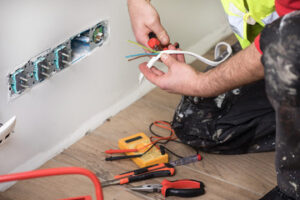Electrician Boise installs and maintains electrical power, communications, lighting, and control systems in homes, businesses, and factories. They also repair broken equipment. Almost every building has an electrical system.

Those interested in becoming an electrician should enroll in a vocational school or an apprenticeship program. These programs combine paid on-the-job training with classroom instruction.
Electricians are the people who keep our homes, businesses and workplaces powered. They are responsible for installing, maintaining and repairing electrical wiring and fixtures. This can involve troubleshooting and diagnosing electrical problems, completing safety assessments and ensuring compliance with regulatory standards.
A qualified electrician should have a high school diploma or equivalent and have completed a formal apprenticeship or other training program. They should also be able to read and interpret blueprints, technical drawings and electrical diagrams. They must also be able to use hand tools and power tools. Additionally, they should be physically capable of standing and maneuvering in confined spaces for extended periods and climbing ladders or scaffolding. They may also need to travel to various sites to install and repair equipment and other items.
There are two primary categories of electricians: line electricians and wiremen. Line electrical workers work outdoors on utility transmission and distribution systems at high voltages, whereas wiremen deal with the lower voltage systems used inside buildings and other structures. Wiremen can specialize in residential, commercial or industrial work.
The duties of a skilled electrician often include working from ladders, scaffolding or roofs to install, maintain or repair electrical wiring, equipment and fixtures. They also install ground leads and connect power cables to equipment, such as motors. Some electricians perform business management duties, such as preparing reports and ordering supplies and equipment. In some cases, they may need to complete quality control assessments on the work of other electricians.
Electricians are also tasked with inspecting and testing electrical systems, equipment, appliances and components to ensure that they’re safe and functioning properly. They must also be able to identify problems and advise managers on whether continued operation could be hazardous. These professionals also conduct regular assessments to identify potential issues before they become dangerous and expensive to repair or replace. They are responsible for identifying and correcting safety hazards, such as corrosion or wear and tear, and determining the right equipment for each job. They must also keep up with industry trends and best practices. Lastly, they must be able to communicate effectively with their coworkers and clients.
Education and training requirements
Electricians need to undergo formal education and apprenticeship to become licensed. Vocational schools and community colleges offer certificate programs that cover the basics of electrical theory and practical skills, while apprenticeship programs provide on-the-job training with experienced electricians. Both options are good choices for students who prefer a more hands-on learning experience.
After completing the educational and apprenticeship requirements, Electricians must take an exam to receive their license. The exam may include questions based on National Electrical Code and local electrical and building codes. Some Electricians choose to obtain additional certifications in specialized fields, such as renewable energy or industrial electrical technology, which can enhance their job prospects and earning potential.
Aspiring Electricians should also focus on developing strong communication and customer service skills. These skills are essential when working with clients and other trade professionals. Moreover, they must be able to explain technical concepts in layman’s terms and work safely on potentially dangerous projects. In addition, aspiring Electricians should seek out opportunities to network within the industry, as this can lead to new job leads and opportunities for advancement.
In the United States, many aspiring Electricians attend vocational school to earn a certificate or an associate degree in electrical technology. These programs usually last for four months to one year and include courses on electrical blueprint reading, residential wiring, and electric motors. In some cases, aspiring Electricians can also take general education classes as part of their program.
Another option is to join a union, which offers training and employment as a journeyman electrician. Union membership may also open up career paths in supervisory and management roles. In addition, unions often provide ongoing professional development workshops and networking opportunities for their members.
Military veterans with prior military or technical training can also make a seamless transition into the civilian electrician profession. This is particularly true for those who have a background in mechanical or HVAC systems. Veterans may also be eligible for GI Bill funding and veteran-focused apprentice programs to help them get started on the path to becoming a licensed electrician.
Work environment
Electricians work in a wide range of settings, including residential homes and commercial buildings. They also work on construction sites, repairing and installing electrical systems. Their responsibilities often involve working with high-voltage electricity, and they must wear protective gear to ensure their safety. Some of their key skills include critical thinking, logical problem-solving, and customer service.
This is a physical job that involves extensive movement and requires good strength. It can also be stressful because of the risks associated with the work. In addition, electricians are required to maintain a high level of technical knowledge. The ability to read blueprints and technical drawings is crucial for completing the job successfully. The job also requires them to perform a variety of tasks such as preparing work orders, reviewing and interpreting plans, and testing equipment.
The nature of the work is unpredictable and can require long hours on call. Therefore, it is important for Electricians to have a strong work-life balance to avoid burnout and stress. This balance is especially vital for senior Electricians who manage teams or own businesses, as they must be able to set boundaries between their professional life and personal life.
While working with electricity can be dangerous, there are a number of tools and methods that can help Electricians manage their workload and improve productivity. For example, they can prioritize their work by tackling the most time-sensitive or safety-critical jobs first. This will allow them to complete their work more efficiently and reduce the risk of accidents caused by fatigue or rushed work.
In addition, Electricians can reduce their stress by ensuring they have enough downtime in between projects. This can be achieved by using scheduling software to plan and organize their work commitments. This can help them keep track of their appointments, reduce the risk of double-booking, and minimize stress.
Electricians should also make a point of pursuing professional development opportunities to stay current on the latest electrical codes, technologies, and safety practices. This will enable them to complete their jobs more quickly and increase job satisfaction. It is also a good idea to prioritize administrative tasks and delegate them to team members, as this will save them valuable time.
Salary
Electricians play a crucial role in our electrical infrastructure. They install, repair, and maintain power systems to ensure the safe operation of buildings, equipment, and other structures. As the backbone of our electrified world, electricians enjoy a promising career path. They can make a decent salary and secure a number of extra rewards.
One of the biggest factors affecting an electrician’s salary is their level of experience. With more experience, they can command higher salaries and benefit from increased job security and a more nuanced understanding of complex electrical systems. Moreover, experienced electricians can take advantage of new technologies that increase productivity and efficiency.
In addition to their basic salary, electricians can also receive additional compensation in the form of overtime pay. This is especially true if they work on urgent projects or during peak demand. In these cases, overtime pay can boost an electrician’s salary by up to 20%.
Some electricians also participate in unions, which can help them negotiate a better deal with employers. These organizations also provide health insurance and other benefits for their members. Some of the largest unions in the US include the International Brotherhood of Electrical Workers and the United Association of Journeymen Electricians.
Another factor influencing electrician salaries is the region in which they live. Larger urban areas usually have higher average electrician salaries than rural or less-populated regions. However, it is important to note that the quality of work can vary from region to region, so you should do some research before choosing a region.
Some of the most common specializations for electricians include industrial automation, renewable energy, and smart home technology. These specialized fields have growing demand, so gaining certifications in these niches can be a great way to boost your earning potential.
The salary for an electrician can vary significantly based on your industry, region, and years of experience. It is important to understand the different factors that affect an electrician’s salary so you can determine the best career path for you. In addition, it’s a good idea to use an online labor rate calculator to determine the maximum amount you can charge for each hour of service. This will help you avoid undercharging your customers and wasting your money.


